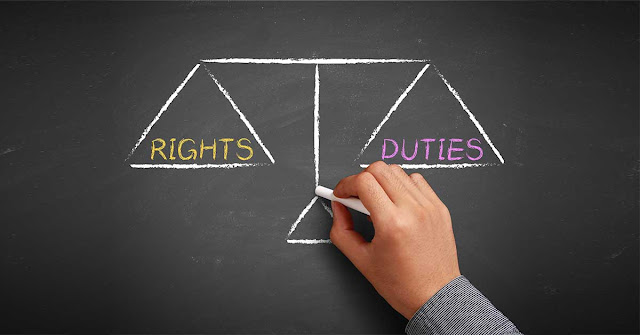DUTIES AND RIGHTS OF THE EDUCATIONAL COMMUNITY
In this class we have understand better which duties and rights do each member of the educational community has and the evolution of the meaning of this terms. Furthermore, we have delved into the implications and consequences that breaking the rules of the community building plan may have and the punishments to be applied.
Origin: https://images.app.goo.gl/CPwDvxv5fW8MrpFk7
I wasn't aware before this class about which aspects and issues should be taken into account while doing the community-building plan. I used to think that this kind of document only envolved the government positions of the school without counting on the parents or the teachers who are in the teacher's board. Moreover, I didn't know how important all the members of the school community are and how many laws are written thinking about them.
In this class I have learnt a lot of things, such as the amount of duties and rights that students and teachers have in the school centre. Moreover, it has really impressed me how the way of punishing the students could influence the interest that students have in their daily school life. I also learnt the differences between the types of conflicts that could appear in the different areas of the school day. It has surprised me that we can distinguish between five different ways of mediation when a conflict appears.
The most difficult thing for me to learn was the different aspects that each type of mediation has and how it involves and concerns the students. It was also difficult to know the conducts that are considered serious breaches of conduct from those which are considered less serious such as small disruptions in class or in some activities.
I have been doing a research and I have understood how important students rights are to avoid that political interests interfere in education. Moreover, ther are some countries where the quality of education get seriously affected by the management and intervention of politics in the educational system. This is what Chubb et al. (1990) explains in an article. He says that the purpose of a public school system is to educate children. He introduces everything about the public schools, from how they are organized to how they are staffed to how they are funded and says that it should be decided with the best interests of children in mind.
I agree with hime because this notion may seem simple and obvious but it does not currently describe the reality of public education. The fact is, in the United States and other democratic nations, the schools are government agencies controlled by elected officials, and decisions about them are made within a political process shaped by calculations of power and self interest. That's why often these calculations have little to do with children and this directly affects to the quality of education and avoids students rights.
Referencies:
I have been doing a research and I have understood how important students rights are to avoid that political interests interfere in education. Moreover, ther are some countries where the quality of education get seriously affected by the management and intervention of politics in the educational system. This is what Chubb et al. (1990) explains in an article. He says that the purpose of a public school system is to educate children. He introduces everything about the public schools, from how they are organized to how they are staffed to how they are funded and says that it should be decided with the best interests of children in mind.
I agree with hime because this notion may seem simple and obvious but it does not currently describe the reality of public education. The fact is, in the United States and other democratic nations, the schools are government agencies controlled by elected officials, and decisions about them are made within a political process shaped by calculations of power and self interest. That's why often these calculations have little to do with children and this directly affects to the quality of education and avoids students rights.
Referencies:
Chubb, J. E., & Moe, T. M. (1990). Politics, markets, and America’s schools. Washington, DC: Brookings Institution.

Comentarios
Publicar un comentario